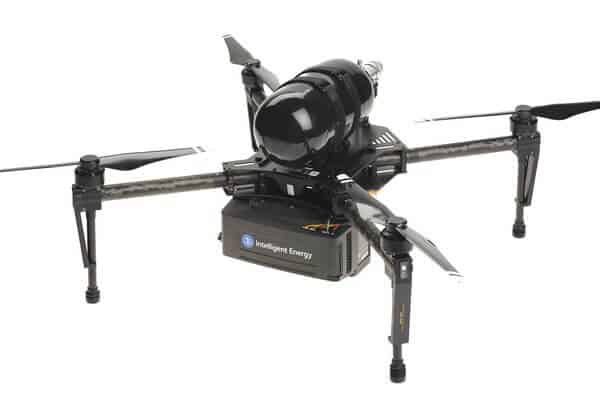

Intelligent Energy has established an agreement with Korean drone technology developer Hogreen Air for the distribution of Intelligent Energy’s lightweight Fuel Cell Power Modules for UAVs (unmanned aerial vehicles). Hogreen Air provide complete UAV solutions to government, defence and other industries, and have broad expertise in drone control and data handling.
According to Intelligent Energy, their Fuel Cell Power Modules are the lightest and most power dense available on the market, providing up to three times the flight duration compared to batteries. Their lightweight design allows them to power larger UAVs with heavier payloads, providing benefits for a range of long-range and heavy-lift drone applications.
As part of the agreement, Hogreen will prepare and obtain Korean Certification (KC), a mandatory certification scheme for electronic products, for Intelligent Energy’s 2.4kW Fuel Cell Power Module (FCPM). Acquisition of this certification will accelerate the product’s introduction into the Korean UAV market.
Lee Juby, Chief Sales Officer at Intelligent Energy, commented: “This is the third partnership announcement we have issued in the last few weeks, which demonstrates our commitment to provide markets with our UAV FCPMs and offer integration and support services. Fuel cells are the only viable solution for commercial UAV operators who need significant flight time, and we will now work closely with our partners who are based in the US, Korea and Japan. I am delighted to welcome Hogreen Air to our network.”
He added: “A retrospectively fitted 2.4kW, mounted onto a DJI M600PRO frame with a 9 litre 300Bar hydrogen cylinder, could achieve a flight time of over 80 minutes compared to just 20 minutes with its battery power pack.”
Hong, Seong Ho, Chief Executive Officer of Hogreen Air, stated: “We are very pleased to be working with Intelligent Energy as part of this distribution agreement. We are very proud to be a company that will be a leader in the UAV hydrogen fuel cell market in Korea.
“We have developed a drone control system using the mobile communication network but have not been able to utilise this yet because of flight time limitations we experience when using batteries. We are delighted to be able to make great advances in the commercial UAV market as longer flight times are now possible. We believe that many of the challenges experienced by drone companies in Korea can be resolved through the application of Intelligent Energy’s fuel cell power products.”







Related Posts
New Drone Fires Thales Missile in Unmanned Air Combat Milestone
UAS Startup Accelerator Awards 3M in Funding
US Navy Orders Unmanned Tactical Resupply Aircraft